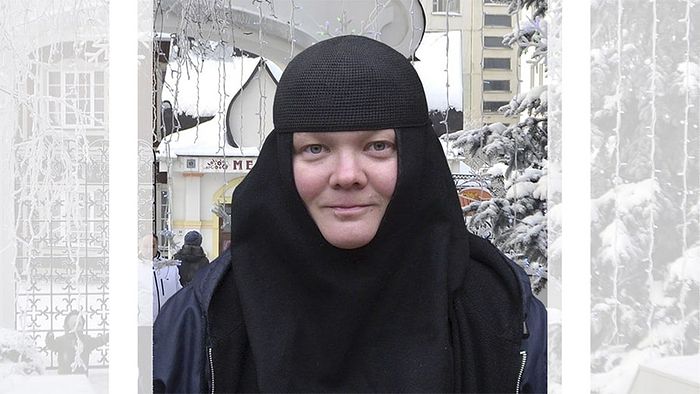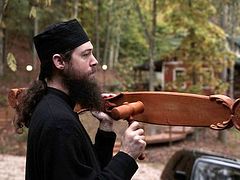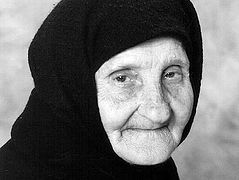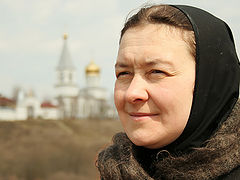Mother Maria (Yakovleva), one of original nuns of St. Elisabeth’s Convent in Minsk, tells about her path to God, the holy Orthodox faith, and the monastic life.
I was born in an atheist family, like many other sisters of our monastery. So in this sense my experience isn’t unique. It was instilled in me from any early age that there is no God. I wasn’t baptized.
My father was a military man, a communist, very strict. The so-called perestroika began in the same year that I started school. Atheism still reigned then, but there was already something different blowing through the air. There were no believers in my circle. Only my grandmother, whom I saw only once every two to three years because she lived far from us, in the Urals, probably went to church sometimes. I think she was praying for me. My grandmother had icons hanging in her house, and I was really drawn to them. I would stand on a stool to get a better look at them. But still, I would berate my grandmother, saying: “Grandma, why do you have icons in your house? They should be in a museum somewhere, not in your house.”
When I was eight, I don’t know how, but I felt that God exists. It wasn’t some kind of vision, there was nothing mystical about it. I just suddenly realized that God exists. I really wanted to visit an Orthodox church, but it was impossible for me at that time. There were very few active churches at that time, and nearly all of them were either in ruins or being used as archives, warehouses, and so on. My father was serving as the head of the border outpost on the Soviet-Polish border. We lived in a military unit in the forest, and I was studying in school in the district center. I don’t think there was a church there. Maybe there was. Either way, I couldn’t go.
I was thirteen the first time I went to church, when I got baptized. By God’s providence, my dad was transferred to serve in another military unit, and there was a girl there I became friends with. We would go to school together. We were in the same grade and sat at the same desk. I loved being at her house. Her mother and grandmother were believers. They were special to me. I never met any believers before that. We would sit in my friend’s kitchen for hours, drinking tea and talking. Then one day my friend’s mother found out that I wasn’t baptized, and she said: “You need to be baptized.” I, of course, was glad to. She became my Godmother. When I told my father that I wanted to get baptized, he was very surprised, but he didn’t stop me. He said: “I don’t understand why, but if you want to, then go ahead…”
So my desire to visit a church was fulfilled when we went to my Baptism. I don’t remember feeling anything special at that time, but I was just glad it was happening. I remember that I didn’t even really like the priest because he didn’t fit the stereotype I had then. I thought a priest should have a long beard and be very serious and important. He had practically no beard and a bit of a crooked eye, and he was always joking. Several years later, I heard that this priest was very sick. He had cancer, and he bore it courageously… When we look at the externals, we are often mistaken.
After my Baptism, my Godmother wanted to give me an icon as a memento and asked me: “Which icon do you want—the Savior, or the Mother of God?” I said I wanted Jesus Christ, because it was God that was important to me. She also gave me a little book with short prayers and spiritual instructions.
After my Baptism, they took me to church once a year, on Pascha, and I would confess and commune, without any understanding of what these Sacraments mean. There was no spiritual literature then—no Bibles, nothing. And there was no internet like now.
Three years after that I graduated from school and came to Minsk for college.
***
My Destiny, Part 2: Entering the Monastery
For me, the greatest joy was that here, in Minsk, there are churches that are always open, and I could go there freely, at any time. And my father wouldn’t scold me here.
I immediately bought myself a big, thick Bible and started to read from the Old Testament. I didn’t understand anything, but I felt that it was a special book, that it wasn’t written by man, but by God, because man cannot see life and individual people and all mankind in the perspective of eternity so well—seeing everything, the entire history of the human race as if from space… Later I realized that it is actually often easier for man to read the Bible not from the beginning, but from the middle, from the New Testament…
I started going to church often—but when I wanted to, not for services. Many people who, like me, weren’t raised in the faith, say: “I love going to church quietly, when there’re no people there. It’s stuffy and cramped when there’s a service. You light a candle, you stand for a while, you think about life.” That’s what I liked to do. I would stay at the service for a while and then leave. Then I noticed it was always the same people at the services, and I was interested. I saw that for them, this was life, and this life, in the Church, is in a completely different world. I wanted to enter this world too.
One time on a feast day I was going past a church (I didn’t know much about feasts then, but I knew that it was Pentecost that day), and I saw people with branches riding on the trolleybus, and they had such joyful, beautiful, bright faces. And I thought: “Oy, they’re probably just coming from church, everyone with their branches.” I started to feel awkward. I thought: “And I wasn’t at church. I need to go to the service.” A year passed this way, with me going to church a little. In my second year as a student, I bought a book describing various religions. I really wanted to learn what differentiates, for example, Catholicism and Orthodoxy. When I read this book, I thought: “That’s it. I want to be Orthodox.”
Around the same time, I bought a book about Elder Macarius of Optina. It contained not just the life of the saint, one of the great Russian elders of the nineteenth century, but it also told about the monastic life in general and about the external and internal way of life of the Optina Monastery of that time. And I thought: “What a beautiful life, like in Paradise! I would like to live this way too.”
But I was very young then, and I was always distracted by something. There was a boy I liked then… I didn’t know what God’s will was for me then and which path I should choose—the monastic or family life. I started confessing and communing often and reading a lot of spiritual literature. I gradually lost all interest in worldly things. I also quit my studies then. I had known since childhood that I didn’t want to live like everyone else. I got bored thinking about what was to come: First I’d finish school, then get a higher education (or even several more degrees). Then comes the career, work, family, children, old age, and then the coffin. And that’s it. I didn’t want to live like that. I wanted something different, but I didn’t know what…
When I was eighteen, I communed consciously for the first time.
I loved reading the Russian classics. I also liked the band Crematorium. They had songs with really dark lyrics. I made some religious friends, and one guy said to me: “How can you listen to that? It’s so dark; you want to just go and hang yourself after music like that.” I said: “No, they’re normal songs. I don’t see anything dark in them.” Later, when I started communing regularly, my perception of everything, including this music, changed. I couldn’t listen to it anymore. Then secular music in general gradually lost all interest for me, and all of secular culture. In the Church, I found the most perfect, the highest human art.
I became a parishioner of Sts. Peter and Paul Cathedral in Minsk, and I found out that Fr. Andrew Lemeshonok1 holds talks there. I started going to the talks with the parishioners, and they became for me a window to another world, to the spiritual life. I gradually started to feel that he was my spiritual father and started consulting him on everything. During the talks, while Batiushka is talking about something, people write him notes with questions. And sometimes it wouldn’t be you who wrote it but someone else, but in some miraculous way God gives you the answers to your questions. Once, a young man, a student, wrote that he would like to enter a monastery. And Batiushka said: “You know, I would advise you not to make such a serious decision rashly, but first at least get an education and live a Church life and pray for a while.” I listened and thought: “This word is for me. I still had three years of school left, but I’ll pray and ask God during that time to show me His will for me.” That’s what I did and indeed, at the end of my studies, God gave me an answer.
I was already in the sisterhood then.2 We started visiting patients in several medical institutions in Minsk, talking with them about God, about the Church, helping them prepare for confession and Communion, and then we started collecting funds to build a church in Novinki. We didn’t think at first that a monastery would emerge on this spot; we didn’t make any human plans at all. I just thought that if we don’t have a monastery, it would be better if I didn’t get married but lived in the world, carrying out my obedience in the sisterhood; but I wouldn’t leave Batiushka and the sisters, because this was my community, my sisters. Several other members of our sisterhood were also thinking, like me, about the monastic life, and seeing the desire of our hearts. Finally, Lord gave us a monastery. In 1999, twelve Sisters of Mercy wrote a petition asking to become residents of the St. Elisabeth Monastery we were founding. Last year was the twentieth anniversary of the founding of our monastery. We began with twelve sisters, and now we’re about 120.











